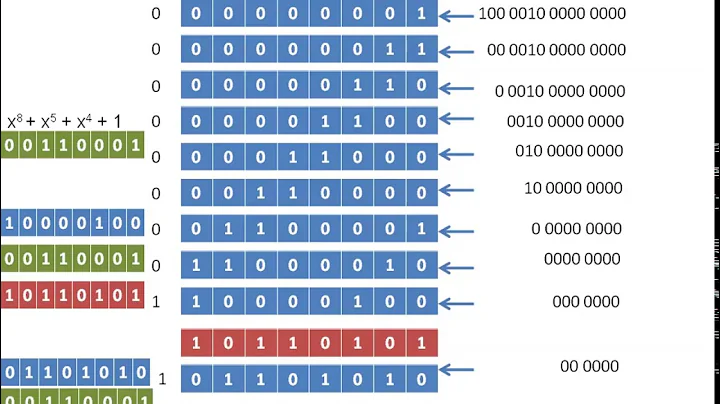What happens with bitwise shift for all 8 bits
Solution 1
It is because of the literal (default data type) for a number (int) is, in most of nowadays CPU, greater than 8-bit (typically 32-bit) and thus when you apply
69 << 8 //note 69 is int
It is actually applied like this
00000000 00000000 00000000 01000101 << 8
Thus you get the result
00000000 00000000 01000101 00000000
If you use, say, unsigned char specifically, then it won't happen:
unsigned char a = 69 << 8; //resulting in 0
This is because though 69 << 8 itself will still result in
01000101 00000000
But the above value will be casted to 8-bit unsigned char, resulting in:
00000000
Solution 2
Bit shift operators act on entire objects, not individual bytes. If the object storing 69 is wider than 1 byte (int is typically 4 bytes for example), then the bits that are shifted outside of the first (lowest/rightmost) byte overflow and are "pushed into" the second byte. For example:
00000000 00000000 00000000 01000101 //The number 69, stored in a 32 bit object
00000000 00000000 01010000 00000000 //shifted left by 8
If you had stored the number in a 1-byte variable, such as a char, the result would indeed have been zero.
01000101 //The number 69, stored in an 8 bit object
(01000101) 00000000 //shifted left by 8
^^^^^^^^
these bits have been shifted outside the size of the object.
The same thing would happen if you shifted an int by 32.
00000000 00000000 00000000 01000101 //The number 69, stored in a 32 bit int
00000000 00000000 01010000 00000000 //shifted left by 8
00000000 01010000 00000000 00000000 //shifted left by 16
01010000 00000000 00000000 00000000 //shifted left by 24
00000000 00000000 00000000 00000000 //shifted left by 32, overflow
Related videos on Youtube
TechJ
Updated on June 04, 2022Comments
-
TechJ almost 2 years
I have a small query in c, I am using the bitwise left shift on number 69 which is
01000101in binary01000101 << 8and I get answer as
100010100000000Shouldn't it be all 8 zeros i.e.
00000000as we shift all the 8 bits to left and then pad with zeros.-
SandBag_1996 about 8 yearsdepends how wide is your variable.. Looks like 16 bits
-
bruceg about 8 yearsif you say int i = 01000101 << 8; then i is 32 bits and the answer you see is expected.
-
TechJ about 8 yearsIn my code i have used int
-
M.M about 8 yearsAll integer arithmetic (including shifts) is done in at least
intprecision
-
-
TechJ about 8 yearsSo you means the answer is 00000000 00000000 01000101 00000000
-
wildplasser about 8 yearswrong. (bit shift) operators act on expressions, not variables.
-
 Ian about 8 years@TechJ ah, yes. It depends on your CPU word length actually. But typically it is 32-bit.
Ian about 8 years@TechJ ah, yes. It depends on your CPU word length actually. But typically it is 32-bit. -
TechJ about 8 yearsThanks Ian for your answer.
-
 ApproachingDarknessFish about 8 years@wildplasser replaced "variable" with "object."
ApproachingDarknessFish about 8 years@wildplasser replaced "variable" with "object." -
wildplasser about 8 yearsIt is not an object (it need not have an addres, for instance) . It is an expression. consider the case
(a+b) <<cOr a literal (like in the example):1234 << x -
 ApproachingDarknessFish about 8 years@wildplasser "A 32-bit expression" makes no sense to me. How do you suggest I rephrase my answer?
ApproachingDarknessFish about 8 years@wildplasser "A 32-bit expression" makes no sense to me. How do you suggest I rephrase my answer?








